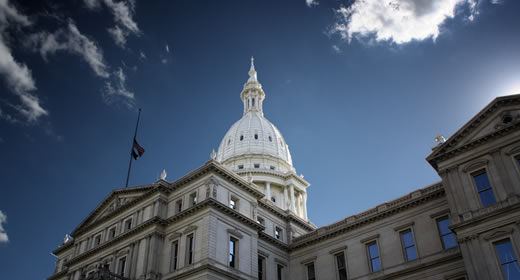
ANN ARBOR—A statewide survey of local officials shows that a majority are very confident in their jurisdiction's ability to administer accurate elections, however, those in Michigan's largest cities and townships—which hold nearly half the population—were more likely to report having experienced election-related problems recently.
The data come from the Michigan Public Policy Survey, a biannual poll of Michigan's local governments. Officials from more than 1,100 cities and townships participated in the study, conducted by the Center for Local, State, and Urban Policy at U-M's Gerald R. Ford School of Public Policy. This edition included city and township clerks who administer elections.
The survey is released a year after discrepancies between paper and computer ballot counts held up the official 2016 election results in Michigan. Widespread difficulties at polling places were also reported in Arizona, Colorado, Florida, North Carolina, Ohio, Pennsylvania and other key battleground states.
Some 44 percent of Michigan residents are clustered into large cities and townships that hold more than 30,000 residents. Officials in these largest jurisdictions—85 percent of which responded to the survey—reported a higher-than-average incidence of election related problems, such as:
- 15 percent reported experiencing a disturbance at polling places, such as inappropriate campaigning or voter intimidation
- 17 percent reported poll worker errors
- 18 percent cited long voting wait times
- 24 percent experienced equipment failures
- 48 percent said they struggle to recruit enough skilled poll workers
"Election administration is one of the most important public services provided by local governments, and so any problems experienced in the process are concerning. The survey finds serious challenges facing Michigan's local governments, and their potential impact should not be underestimated," said Thomas Ivacko, associate director of CLOSUP and one of the report's authors. "Even if things are good almost everywhere, is almost everywhere good enough?"
The survey explored incidence of election administration problems, satisfaction with poll worker and city clerk election training programs, perspectives on the state's effort to update voting equipment, and attitudes toward election reform.
Other key findings include:
- Officials in 91 percent of Michigan's townships and cities are "very confident" that their jurisdictions can administer elections accurately. Eight percent are "somewhat confident" and 1 percent are "not very confident."
- The most common election administration problems statewide are recruiting skilled poll workers (29 percent) and recruiting enough poll workers, regardless of skill level (27 percent). In addition, 25 percent say the cost of administering elections is a problem for their jurisdiction.
- Sixty-seven percent of local officials support the state's initiative to update voting equipment by August 2018. Fifty-seven percent agree it will be worth the costs involved and a similar number—58 percent—think the state's plan for cost-sharing is appropriate. At the same time, just less than half—48 percent— of local officials overall agree the new equipment will help significantly improve their jurisdiction's election administration, although more than 60 percent of the clerks who oversee elections agree.
In the area of election reform, local officials are more likely to support than oppose:
- Absentee voting with no excuse (66 percent support; 19 percent oppose)
- Synchronizing voter lists with other states (50 percent support; 10 percent oppose)
- Stricter regulation of voter registration drives (49 percent support; 10 percent oppose)
- Stricter voter ID requirements (46 percent support; 17 percent oppose)
They are more likely to oppose than support:
- Same-day voter registration on Election Day (66 percent oppose; 17 percent support)
- County government taking over local election administration from cities and townships (57 percent oppose; 23 percent support)
- On-site early voting prior to Election Day (50 percent oppose; 32 percent support)
"Although we saw in 2016 widespread concerns all across the nation related to the voting process, here in Michigan most of our local officials are very confident in their elections," said Debra Horner, project manager on the MPPS program. "However, we should also keep working to solve any problems that are occurring. The state's initiative to update voting equipment provides progress in that area, and support among local officials for various reforms may be another avenue."
Michigan Public Policy Surveys were sent April 3-June 2, 2017 via hard copy and the internet to the top elected and appointed officials in all counties, cities, villages and townships in Michigan. A total of 1,372 jurisdictions returned valid surveys, a 74-percent response rate. The margin of error for the survey, as a whole, was 1.3 percent. For analysis of clerk-only responses, the MPPS received 881 valid responses from city and township clerks, resulting in a 58-percent response rate for this sub-sample.
More information: